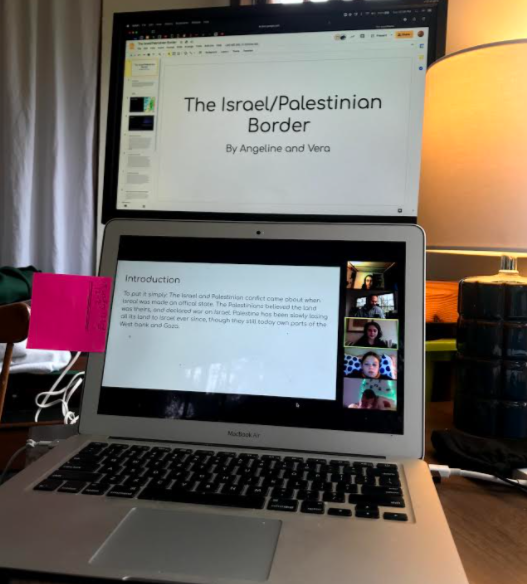Hyla Stories
Analyzing global patterns and relationships in History

Hyla’s 7th and 8th grade History classes examine global perspectives through thematic units, preparing students to become analytical citizens of a complex and connected world. History teacher David encourages middle schoolers to evaluate historical patterns and relationships through time. Starting the year with the theme of origin stories, the 7th graders have now moved on to the theme of borders and identities. Borders define our existence, helping us know who we are, yet they are human-made and change over time. How have borders been defined in the past and how are they defined today? David points out that multimedia resources on the internet allow students to access a wide range of stories and experiences from people around the world. Together the class learned about The Great Wall of China, the Mongols, and imperialism in Africa. Now the seventh grade students, each paired with a partner, are studying one of the following sets of borders: Israel/Palestine, U.S./Mexico, North Korea/South Korea, Pakistan/India, China/Taiwan, Russia/Ukraine, Somalia/Somaliland, and Northern Ireland/U.K. (See photo for an image of one presentation on David’s computer workstation). As they prepare their presentations, David is asking students not only to learn about the origins and significance of the borders, but also to understand the historical perspectives and the impact on identity. David says students have been very engaged. “It has been really fun…to see how alive they’ve been in discussion.”
After finishing a unit on technology and the industrial revolution, 8th graders began a new unit on government and power during the week of the U.S. Presidential election, listening to speeches from Biden, Obama, and Trump. Looking to the past, present, and future helps students understand what it means to be a good leader. How have leaders in the past developed, maintained, and expanded power? How are leaders today changing or maintaining the way power is wielded? How can we support political leadership that reinforces our most important values? Right now the eighth graders are diving into one of three research projects: evaluating a leader from the past, comparing a current leader with a past leader, or imagining the future of global leadership. Some of the leaders Hyla students selected to study include: Golda Meir, Haile Selassie, Sun Yat-sen, Queen Victoria, Tsar Nicholas II, Ronald Reagan, Benazir Bhutto, Nelson Mandela, and The Dalai Lama.
In distance learning mode, 8th graders are working independently and developing their research skills while receiving individualized guidance from David during class time. Students use the Gale in Context database, a tool available through the Kitsap Regional Library System. This tool keeps students focused on vetted sources. David emphasizes that evaluating leadership is difficult, “an adult skill”, but he wants Hyla eighth graders to feel that power and responsibility. In the context of the intensity around the recent US Presidential election, he wants students to gain these valuable skills and perspectives, so that they will know how to think for themselves and not just “jump on a bandwagon”. As David says, 2020 has provided “an opportune moment” for Hyla students to be inspired and excited to evaluate and analyze government and power.
